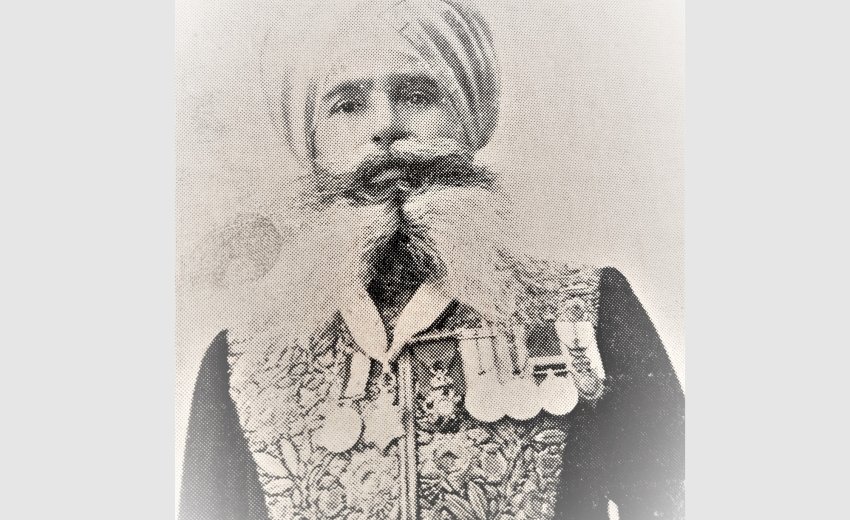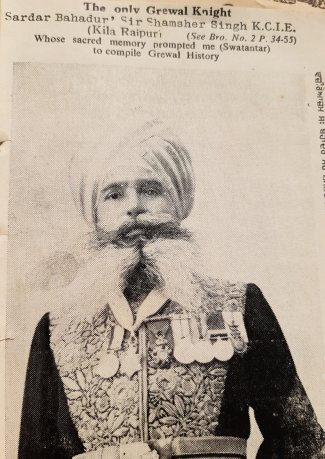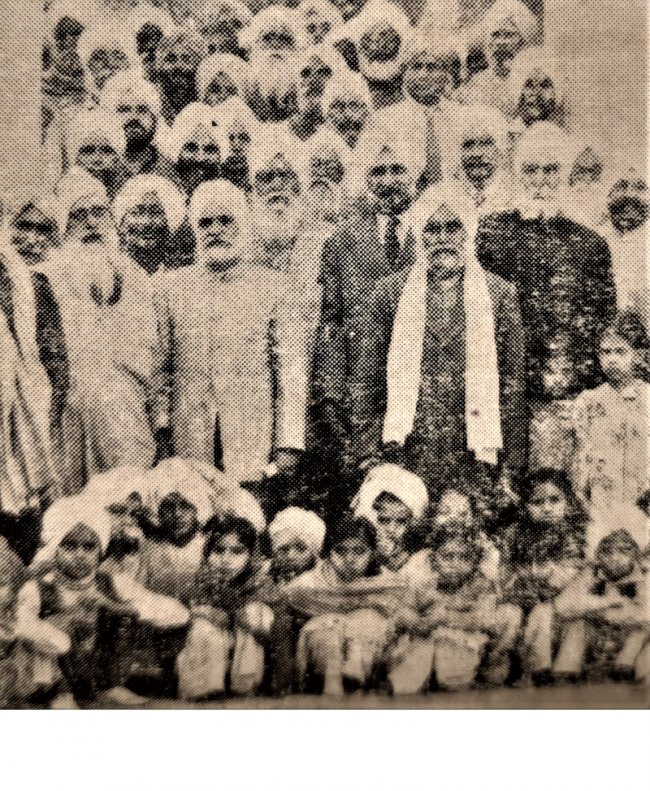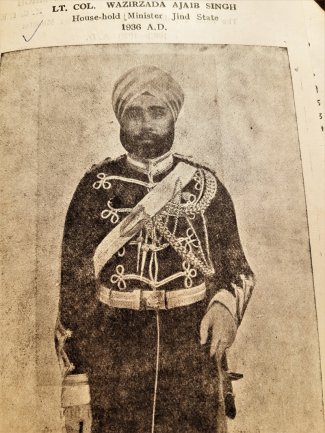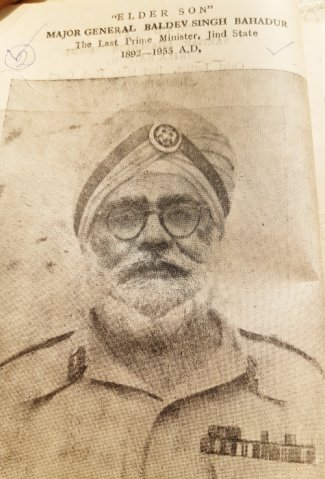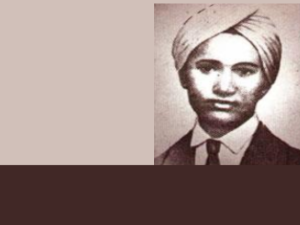Kila Raipur has been blessed by many religious and political luminaries who include Sardar Bahadur, Sir Shamsher Singh K.C.I.E. (Knight Commander of Indian Empire), Chief Justice and Chief Minister Jind State, Major General Baldev Singh Bahadur Chief Minister Jind State, Sardar B. S. Grewal ICS, Financial Commissioner, Haryana and Chief Minister of Faridkot State, Lt. General Natha Singh, Minister Defense Jind State, Lt. Col. Ajaib Singh Swatanter Minister, Revenue and Rehabilitation Minister Jind State, Wazirzada Sardar Mahinder Singh Grewal, Grewal Enterprises, and many more such luminaries. Sardar Bahadur, Sir Shamsher Singh, K.C.I.E. Chief Minister Jind State towers them all.
Sardar Bahadur, Sir Shamsher Singh, K.C.I.E. was born in Pati Ranga at Kila Raipur, Ludhiana District, Punjab on 8th January 1860 in Sardar Jaimal Singh’s family. His grandfather Sardar Rajinder Singh named his eldest grandson as Shamsher Singh. He spent most of his childhood with his uncle Sardar Attar Singh Indian Order of Merit (I. O. M. equivalent to present Victoria cross and Param Vir Chakra) K.C.I.E..As he grew up, He received his earlier education at Kila-Raipur and Rahon schools and joined the Government College, Lahore in 1877. After his education, he joined his maternal uncle, Risaldar Chanda Singh in Cavalary’s 3 Regiment and saw active service as he went to second Afghan war (1878-80). He won the war medal and bronze star for the famous Kabul to Kandahar March in 1880 A.D. Due to his knowledge of English and Persian, he was appointed as interpreter. The commanding officer of the regiment held him in high regard.
Maharaja Raghubir Singh of Jind called him in 1885, having been impressed by his education, discourse, tolerance, and quick reaction. He was appointed Babu (a clerk) and he was made responsible for English work. Thereafter he became famous as Babuji in administrative circles. The advice of Babuji was greatly valued in the royal house and his prestige increased day by day.
Thereafter, he got quick promotions and held very responsible posts in Jind State. Maharaja Raghubir Singh died in 1887 and the administration came into hands of administrative council. During those days of administrative council, Babuji worked on the posts of 1) Post master general 2) Council of confidential secretary 3) Private and Confidential Secretary to the Maharaja.
Maharaja Ranbir Singh was appointed as the new ruler. When Maharaja went to Burma for a tour, Babuji accompanied him. Maharaja was afraid of the airplane flying over the sea. Babuji asked him not to fear but remember Wahiguru and nothing will happen. Maharaja was greatly relieved of the fear reciting Wahiguru
Ranbir Singh got the permission to take over as Maharaja in 1899. Babuji was appointed as Chief Justice of the state. He performed his responsibilities with loyalty, sincerity, dedication and truthfulness. The residents of Jind and Charkhi Dadri used to say this with great pride, “High court ma Babu, na aavai kisi ke kaabu” (No one can surpass Babuji). He held this office with unique distinction earning respect of the Maharaja and great applause from the public. In 1903, he was made overall in-charge of the state administration as Ahalkar Ala (Chief Minister) where he enjoyed full confidence of the Maharaja and his subjects until his death on 8th March, 1920.
Keeping his memory ever alive are the works of public usefulness carried out during his time, in which no other administrator after him could equal him. These include free education for girls, renovation and construction of more schools for boys, orphanages, veterinary-hospital, roads, drainage system, electricity, military hospital, infantry and body guard lines etc. Corruption was unknown in the state during his administration. He maintained a very high level of efficiency by getting the residents of state educated and giving practical training. All local people were preferred for jobs and no official was imported from outside in his time.
Sardar Bahadur Sir Shamsher Singh holds unbeaten records of (1) serving the state for 35 years with tact, integrity and high sense of justice, (2) being the first and most illustrious Wazir in Jind, (3) the only Minister to get K. C. I. E. (4) to retain continued trust of people, Maharaja and Govt. of India throughout his long tenure of high office for over 20 years, (5) to be the singular Grewal Knight and only Jat Sikh official to be knighted in Phulkian States. He knew no religious distinctions in the work of Govt. His Justice was equal and impartial to all.
Hundreds of anecdotes about his ability, farsightedness, justice and other activities of public usefulness, particularly the “Zabani Arz” i.e. (daily verbal hearing of public requests which was the most popular and prompt method of immediate relief to the poor and helpless) are ever fresh in the memory of the people. Some illustrations of his Administration, Public welfare and justice system are given below:
Interest in public welfare
The stories of his instant and accurate justice and care for public spread widely and even have been quoted later. Without caring of himself, he cared for the public and tried to provide good life to the people.
1. Any complainant could meet the prime minister at early hours (Amritwela). There were no fees for such meetings. Even the poorest of poor without spending and without going door to door, or without paying to peons could meet the prime minister.
2. No official can ill-treat any individual.
3. There was no loot of advocates or corruption or court fees.
4. After going through the mail of the state a bell used to ring so that the person could complain to him regarding any inconvenience caused by the courts.
5. After meeting all complainants only, he used to have his food.
Sympathetic Attitude:
One day a blind old woman and her one-eyed husband came to him weeping and requested, “Respected sir, we had only one ten year old son, whose income from rearing of animals helped us to run our house. We had not seen him for last two days. We don’t know where he is or is he alive or not. We don’t have anyone else to look after us.” Wazir Sahib enquired, “Did you complain to police?” They said, “Yes we did, but no one paid attention to us.” Hearing this Wazir Sahib called Shadi Ram, inspector general police. Meanwhile orderly reported that “Meals are ready” he replied, “Till these souls are sad I cannot have meals. I will not have water till the son of this old couple is traced.” By the time the thana police personnel also came, he said, “You’re suspended till you find their son.” The frantic search for the boy started. The boy had drowned in the pond while with his animals having water from it. His body was found after 6 hours. The livelihood of the old couple was ordered to be done by religious humanity department.
Administrative Efficiency and Instant Justice
Once, a marriage party of a rich man’s son came to Jind from Hansi. The costly clothes, heavy ornaments, a Gold Chhatar and other costly items which they had brought were stolen at night. Wazir Sahib was then in Jind. Early morning, the head of the family came to Wazir Sahib gave the details of the theft. Wazir Sahib said, “Don’t worry Seth Sahib. The loss is not your; it is of the state.” He immediately called the tehsildar and ordered him to give the best ornaments and Chhatar from the state treasury, so that there was no impact on the marriage celebrations. He then ordered the police head to restore the stolen item at the earliest. The police was able to catch the thieves and the stolen items were restored to the marriage party head.
Public Welfare
Public welfare remained the priority of the state under him. Service to the people made him happy. During his responsibility, there was a great flood in many villages of Sangrur. Railway line Dhuri-Jakhal was under construction then. The flood water was stopped by this railway line and the villages got flooded. Railway land was considered the property of the British government and state government could not interfere in the progress in any way. As the water level was increasing more villages were getting undated. He asked the railway engineers to allow the water to pass from under the railway line for which it had to be dug. The engineers did not allow saying that for this permission will have to come from Delhi. This would have caused a long delay and more villages would have inundated. He said, “I take on this responsibility to get clearance from the Government but you will have to allow the water to pass”. As the engineers did not do it he put his own men and got a way for the water to pass from under the railway line. Thus many villages were saved from drowning. The engineers reported the matter to the British Government. The political Department raised a hue and cry. Matter went to the Governor and he was asked to explain this. Wazir Sahib said with a cool mind, “This digging down the railway lines has been done with my orders and I take the full responsibility. It was done as an emergency measures since I could not allow my villages to be drowned in water. There was no alternative left with me. I did not do this to interfere in your powers at all. Whatever punishment you want to give me I am ready for that. I will have no regret. The Governor was pleased at his reply and the complaint was filed.
Strict control
Giving an illustration of the ‘powerful control’ it was stated that on 8.1.1961 that during 1915-16 when the formal foundation of the Sangrur Singh Sabha was laid by Wazir Sahib, a Committee of 4 Sikh officials was formed to supervise and accelerate the work. The secretary and most important member of this committee was the State’s Chief Engineer, Sardar Sher Singh Garh Kaptan. One day the committee came to Wazir Sahib’s office, when he was having urgent confidential talks (takhlia) with members of the Council Wizarat. They had to wait a long time before being called in. As soon as they entered the room, Wazir Sahib apologized for this long wait and more so there was no bathroom attached to the visitors’ room in his office. But he added the responsibility for not making a bathroom lies with their secretary. The state engineer, promptly replied, “Yes, sir, I own it and feel there is no need of bathroom here.” ”Why so?” was the question and all the assembled high officials grew keen to hear the answer. Sardar Sher Singh Engineer said, “Sir, leave alone a urinal here, as soon as the telephone summons from Wazir Sahib are received by an officer, his entire family dare not urinate; till he announces all well on return.” The assembly burst into laughter at this quick witted answer. Several subordinates are known to have dropped unconscious at Wazir Sahib thumping the table in rage at their irregularity or dishonesty.
Stopping Thefts
Many complaints were received from Jind state that Ranghars from British territory frequently caused theft in Jind state. Wazir Sahib ordered the police to arrest the chief and other key thieves of the Ranghars to be arrested without delay. . Immediately after arrest they were put behind bars in Sangrur Jail and put through hard physical punishment forcing them to give in writing they would never enter Jind state. The result was that after they were released they never entered Jind state as promised
Right Appreciation of Situations
One day Maharaja found that the guards of Maharani Sahiba of Raipur are very lazy then he asked Babuji to find some active guards to replace them. Babuji said, “The guards must be sincere to the royalty and should possess a good background. They must respect royalty from the bottom of their hearts.” Maharaja asked for recruitment of such officers and soldiers. In which Babuji helped.
Cooperation and Coordination with his other ministers
Wazir Sahib maintained great cooperation and coordination with his ministers and staff. They all had in him and his decisions. About him it was famous that, “Wazir Sahib presents his well measured points of view which is accepted by all without question”. Rai sahib would say,” You are absolutely right.” Minister Prem Singh would say,” It is factual sir,” From among all the Wazirs, Meer Sahib was the eldest who became hard of hearing at at a later stage, Once Wazir sahib asked views about a plan from all. Every one said yes including Meer Sahib. Wazir sahib said, “Meer Sahib! Have you heard what I have said?” Meer Sahib replied, “I would have replied the same way even if I would have heard.” The justice, cooperation, coordination, public welfare and loyalty of these council ministers were exemplary.
His Unique Method of Explaining:
While in Jind he got a report that the caretaker of the Gurdwara behaves erratically with the visiting sangat. He along with one of his officers in the garb of old men visited the gurdwara at night and knocked the door of the caretaker asking for the food. Caretakers replied harshly refusing to give any food at this time of the night. Wazir Sahib then went to the cook (langri) and asked for food. The cook prepared the food and gave it to them. Next day he called the cook and promoted him. The caretaker enquired from the cook the reason of his promotion. Cook told about Wazir Sahib’s visit. Shivering, the caretaker went to Wazir Sahib and accepted has bad dealing with sangat and asking for excused promised to behave well in future.
Controlling Corruption
It is not wrong to state that under Sardar Shamsher Singh’s control, corruption remained strictly banned. Even if some police man or any other department person took some bribe, in fear of Wazir Sahib, he returned the same. He promoted only clean persons and those involved in bribes were shunted out without delay.
One day, while on a surprise visit he found an old lady with a full utensil full of ghee on her head going towards Tehsil. Wazir Sahib asked him as to where she was going, “I am going to tehsil.” When asked why she replied, “You are not Babu who removes problem on hearing.” Wazir sahib said, “If you tell me the problem, I may help to solve the problem.” She said, “I am going to Tehsildar. He does not record the land on my son’s name.” He asked the name of village and the name of the boy and his father. The old lady went to Tehsildar. He left a servant saying that “when this old lady returns bring her to me”. When she was brought, having seen the empty utensil, he called for the tehsildar with land-records of her village. Seeing the old lady there tehsildar presented the land records. Wazir Sahib asked him, “Why did you take so much time in updating land records on the name of this old lady’s son?” Tehsil was sweating profusely. “Was there any hurdle in putting the land on her son’s name?” Tehsildar replied in the negative. “Her son is the rightful claimant of the land”. “Was it the Ghee given to you by the old lady which worked now?” Tehsildar nearly fainted. Wazir sahib asked his peon to take that ghee from tehsildar’s office and return to the old lady at her home. The tehsildar was suspended for six months with immediate effect.
Truthfulness
He despised falsehood and loved truthfulness. Those who told the truth and asked for forgiveness were instantly excused and gave the advice: Falsehood has to get exposed and Truth will always prevail. (Kood Nikhute Nanaka orak sach rahi). When he got his stamp for his family got registered in London Court of Heralds he got the above written into the stamp.
Quick witted
His reciprocation can be cited from one example. Maharaja Jind Sardar Bahadur Raghubir Singh was of quiet tall while Babuji was not. He jokingly said, “You must be saving lots of cloth, as you are short in size, but to open the big door there is need of tall person like me.” Babuji laughed and kept quiet. After sometime, watching overhead clouds, Maharaja asked, “Babuji! When will the rain come?” Babuji bowed and responded, “Respected Sir! You are closer to the clouds than me, you can ask them easily.” Listening to this, all present in the royal court had a hearty laugh.
True to his words:
After Afghan War, he wanted to leave army but his CO wanted to lure him with higher promotion though did not succeed. His CO remarked, “I believe you got all these war medals to get a good civil appointment.” Sardar Shamsher Singh replied “Sir, I promise I will never use these awards for my appointments and promotions.” For 25 years, until he got other medals and decorations, he did not wear these two medals.
Religiosity
He treated all religions equally and has openness of mind while dealing with religious problems. He appreciated the good qualities of each religion and kept company with saints The religious luminaries in touch with him included Sant Attar ingh Mastuana, sant Harnam Singh Ji Roomi, Brahmchariji of Jind, Sant Beeramdass ji of Badhochhi, Munshi Ahmed Jan Ludhiana, Haji Umar Din Sahib Ludhiana, Sant Madu Ram Lsoi etc.
His own daily routine was dedicated to religious practices for two and a half hours daily. He may be delayed or may have to forego rest but he will never forego his daily routine of religious practice. He used to regular do recitation of 5 Banis and meditation on God. He used to say, “I have achieved all this due to God’s Grace and I cannot afford to forget Him”. He gave this education to his following generation and ensured that they all followed a religious routine
Honours and Awards
- The Afghan War Medal 1879-80
- The Bronze Star for Kabul to Kandahar March 1880
- Delhi Coronation Durbar Medal 1903
- Sardar Bahadurship Medal 1906
- Delhi Coronation Durbar Medal 1911
- Medal of C.I.E. (Commander of Indian Empire), 1911
- Badshahi Mela medal 1911
- Knights’ Gold Star 1917
- K.C.I.E. (Knight Commander of Indian Empire) Gold Medal 1917
Appreciations
His Administrative Capabilities and timely and appropriate Justice have been well appreciated by the Maharaja and the British who honoured him with K.C.I.E., (Knight Commander of Indian Empire) the highest English honour for Indian Civilian Administrative Officials then.
On 15th December, 1911, H. H. the Maharaja issued an order (Furman) appreciating his service addressing him thus:- (Page 35)
:Jind State Camp, Coronation Darbar,
15 December, 1911
My dear Sardar Sahib,
………. I have always appreciated your services to the state, not only during my reign but also in that of my dear grandfather and during the tenure of council of regency proceeding as my investment with ruling powers.
As regards your work during my reign first as Chief Justice and afterwards as Senior Ahalkar Ala (which designation was changed to Chief Minister in 1909). I can say without hesitation, your work always showed tact, integrity and a high sense of justice whereby you not only won my approbation, but also gained confidence of the people.
………… I feel that I should mark this occasion by a practical indication my own appreciation of your services, and I have, therefore, today issued a Farman (No. 257)”
The political department of the govt. of India wrote on 1-11-1909:-
“……….this is to express an appreciation of your work. In my dealing with you I have always found you looking to the interests of your noble master, the Raja and the state which he rules, your loyalty to his highness is well known and I sincerely hope that you may long remain as his right hand to help him to maintain the efficiency of the state administration and increase it.”
On 27-2-1913 the Governor of Punjab appreciated the services of Sardar Bahadur in the following terms at H H’s banquet:-
“Much of this success is due to the wisdom of H H. in selecting a really good Chief Minister in S. B. Shamsher Singh and supporting him steadily throughout. H. H. has, if I may say so, one of the greatest gifts of a ruler. He knows how to select a good minister and when he has selected him to give him a free hand……”
On 8-1-1916 H. H. Jind thus drank a toast to his health on his birthday’ at Camp Ranika,
“My dear Wazir Sahib,
……….may the Almighty spare you to see many more of them and that we may have you long with us to steer my ship of state with the same wisdom and conspicuous ability which have characterized the discharge of your office ever since you assumed the reins of Chief Minister.”
A meeting of prominent members of Grewal Sikhs of Ludhiana District and Patiala, Nabha, and Jind State was held on 23-3-1947 at Kila Raipur. Sardar Dasaundha Singh Advocate, Ex- minister was elected President and authorized to submit the resolution, “Riasat Jind men Siasi Bedari” to H. H. the Maharaja Rajinder Singh Bahadur of Jind. The president in his covering letter said, “……..the late Sir Shamsher Singh had served your highness and the state as Chief Minister with remarkable devotion and great ability. It is a matter of common knowledge that throughout his career as the occupant of the highest office in the State, he enjoyed your highness’ and your subjects’ confidence, regard and esteem in such a high degree that none of his successors could boast of coming anywhere near him in all that………the state subjects cherish his memory with feelings of respect and gratefulness.
…….. Sir Shamsher Singh was a very prominent member of Grewal Community……..”
Ludhiana.
24-3-1947
(S/d.) Dasaundh Singh, President, Advocate
Sardar Kartar Singh of Akoi gave instances of quick and cheap justice, immediate relief to the needy on verbal solicitations and suggested that the excellent method of Sir Shamsher Singh’s administration was so popular and unique that a typed copy of its main principles and points should be hung in each office of the state.
His Obituary and Memorials
Sardar Bahadur Sir Shamsher Singh died at his residence, Minister’s house (now Glad Hurst) Sangrur on 8th march, 1920. To commemorate his memory there was liberal voluntary contribution from all concerned and a fine building outside Sunami Gate, Sangrur was built shortly after his death under the management of Sir Shamsher Singh Memorial Committee. The memorial building is at present given to Guru Nanak High School, on lease at concessional rate. One condition of the lease is that the school management must celebrate 8th March each year as the Death Anniversary of Sir Shamsher Singh by holding an Akhand Path and observing holiday aftr the function. The following inscription is put on the front gate of the Memorial building:-
“A tribute by residents of Jind State to the everlasting and beloved memory of Sardar Bahadur Sir Shamsher Singh, K.C.I.E., Chief Minister of Jind State born 8-1—86 A.D. died 8-3-1920. A.D.”
An impressive mausoleum or Samadh of Sir Shamsher Singh is situated at about one mile from the town, between the Railway Lane and Sangrur-Dhuri road. On the samadh are engraved Urdu couplets mentioning the date of his demise in Abjad system, by two prominent poets of the time.
A commodious Science Hall has been donated in Sir Shamsher Singh’s name by his sons to the High School at Kila Raipur. The Birth Centenary was celebrated on 8-1-1960 AD at Kila Raipur. Many notables paid glowing tributes to the great departed soul. Messages of regard and affection were received from eminent persons. General K.M. Cariappa O.B.E. ex-Commander in Chief of India observed in his message:-
“On this great and auspicious day of the Birth Centenary Mahautsav of the late Sardar Bahadur, Sir, Shamsher Singh Grewal, K.C.I.E., flash into my memories, most delightful memories- of the week I spent in Sangrur, during Christmas in 1918, as the guest of this noble and great son of India, who is no more. He inspired me and impressed me- the young lad of 18, I was then very much. His dignified and gentle personality was a joy to the eye. Thanks to “Ajax” (Ajaib Singh) my very dear and affectionate friend – I had the opportunity of meeting and seeing so much of this fine man. “Ajax” and I were cadets together in the Daily College – Indore – at that time. May God keep this departed soul with Him forever and ever.”
The Roshanara. Mercara, Coorg S.I.
8-1-1960
Sd. K. M. Cariappa, General:-
He also sent the following telegram:-
“May your father’s great name live forever” – Cariappa
Maj. General Harnarain Singh, Military Secretary to the President of India, New Delhi, wrote:-
“….. he was a very great man and we are all proud of him. Anything done in his memory is well worth it……” “……….I am sure the celebrations will be worthy of the exemplary life that he led and the capabilities he displayed in whatsoever sphere he was made responsible for. I wish the celebrations all success.”
An eminent scholar and historian Shri. U.S. Rao wrote:-
Krishna Basti
4-10-60
“My dear Wazir Sahib,
I am sending a copy of the ‘Qita’ by Lala Sita Ram, a school master in praise of the late Waziri-Azim Sahib. In my opinion the value of the ‘Qita’ is not poetic as much as historical. The verses convey the great esteem and awe in which he was held even during his Chief Justice-Ship. He must have captured the imagination and hearts of the people, as it so most eloquently appears from this contemporary writing as early as 1920 AD. It is not difficult to estimate what unique central position he came to occupy in the head and heart of the Ruler and the ruled in latter days.” The Urdu “Qita” referred above appears on page 20 of Janam Samagam Souvenir No. 2.
Dr. S.P. Chatterjee F.R.C.S. Retd. Chief Medical Officer Jind State wrote from West Bengal:-
Halisapar,
11-1-61.
“My dear Swami ji,
Many thanks for your kind invitation to the birthday anniversary of your revered father and for the good wishes for the New Year. I very much appreciate and heartily endorse your observing such anniversaries and wish that every sensible man will do likewise. This is akin to Shintoism as observed in Japan and has got a great moral value on the descendants, who should think in terms of the greatness of the family one belongs to and should also emulate his qualities of the head and heart and be proud of it, and should conduct themselves accordingly.”
Sardar Bahadur Inder Singh P.C.S. Retd. Session Judge, Punjab, wrote:-
17-Hardwar Road,
Dehradun (U.P.)
24-1-62
“My dear Ajaib Singh ji
I have been reading about your activities and movements as occasionally published in the press, especially those relating to your illustrious father. It is so gratifying to me, that you continue to cherish such filial sentiments.”
Khaliffa Mohammad Sadiq ex-Dewan Jind State wrote from West Pakistan:-
18 Davis Road, Lahore
26-1-62
“My dear Colonel Sahib,
How grateful I am to receive your pamphlet which reignites love in heart for the deceased soul of a great man who did all his best for the State and her Maharaj. The truth value of those days was speculative as compared to that of the present day. Things of old fade away, but the glory of Sir Shamsher lasts in our hearts as fresh as it was when he was alive……..”
The death anniversary of S.B. Sir Shamsher Singh K.C.I.E. is commemorated on 8th March each year, by an Akhand Path Bhog in the Sir Shamsher Memorial Building, Sangrur, by the Guru Nanak High School. In addition to the Annual Akhand Path at the Memorial a monthly Sehajpath is held on 8th of each month at the mausoleum (samadh) on Dhuri road, Sangrur. The birth and death anniversary bhogs are also held at the Samadh on 8th January and 8th March respectively each year.
Family
S.B. Sir, Shamsher Singh S/o Sardar Jaimel Singh Grewal hailed from Kila Raipur, Distt. Ludhiana. S.B. Sir, Shamsher Singh K.C.I.E. served the Jind State for 35 years and most conspicuously as Chief Justice and Chief Minister from 1899-1920 AD. He had two sons Maj. General Baldev Singh Bahadur, and Lt. Col. Wazirzada Ajaib Singh Sardar-i-ala.
“THE GREAT KNIGHT”
Hundred years ago was Sir Shamsher Born
To be a scholar, soldier, statesman as time wore on
Having won medals for War and great march
He came to Jind as Ruler’s trusted English Clerk.
Soon he made his mettle and ability felt
‘Babu ji’ was much admired on right & left
More and more he gained favor and popularity
As Chief Justice of the State Judiciary.
His ‘Wizarat’ was great, unique & unequalled
Sir Shamsher stands out by himself unrivalled
Help for the helpless, need for the needy was he
Richly deserved the high honors of K.C.I.E., S.B.
Comfort, glory and fame he had to heart’s content
For which thanked God most grateful and intent
Only one last thing he yearned and didn’t get
Was worship of God of all other attachment bereft?
His plan of seclusion remained a mere dream
As the cruel death came with unwanted scream
This ambition may yet be achieved through reflection
If his ‘Ajaib’ gets due spiritual protection.
Kind courtesy
1. Grewal Association Ludhiana,
2. Grewal Itihas Committee, Brief History of Grewal, Tract Sr. 1 (Pages 34 to 56)
